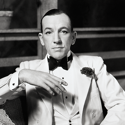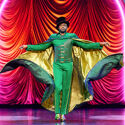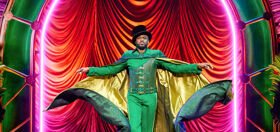 QUEERTY EXCLUSIVE—Everyone from the Associated Press to the San Francisco Weekly to the The Portland Mercury has called Harvey Milk “America’s first openly gay politician.” Not to take away from the life and legacy of the San Francisco City Supervisor, but that honor belongs to Jerry DeGrieck and Nancy Wechsler, both of whom came out while serving on the Ann Arbor, Michigan, City Council in 1973. They would be the first to come out, but the following year Minnesota State Senator Allan Spear and Massachusetts State Representative Elaine Noble would join their ranks as well as Kathy Kozachenko, who joined the Ann Arbor City Council running as an openly gay person, the first to ever win an election while out. These early politicians helped pave the way for Harvey Milk’s 1977 run in San Francisco.
QUEERTY EXCLUSIVE—Everyone from the Associated Press to the San Francisco Weekly to the The Portland Mercury has called Harvey Milk “America’s first openly gay politician.” Not to take away from the life and legacy of the San Francisco City Supervisor, but that honor belongs to Jerry DeGrieck and Nancy Wechsler, both of whom came out while serving on the Ann Arbor, Michigan, City Council in 1973. They would be the first to come out, but the following year Minnesota State Senator Allan Spear and Massachusetts State Representative Elaine Noble would join their ranks as well as Kathy Kozachenko, who joined the Ann Arbor City Council running as an openly gay person, the first to ever win an election while out. These early politicians helped pave the way for Harvey Milk’s 1977 run in San Francisco.
Now a Public Health Manager and Policy Advisor to the City of Seattle, DeGrieck sat down with us to talk about his unsung role in the history of the gay movement and talk more about how a 22-year-old University of Michigan student wound up being an unintentional pioneer for gay rights.
QUEERTY: I think the best way to start is to just ask you what happened? How did you come out?
Jerry DeGrieck: We were part of the Human Rights Party, an independent 3rd party in the state of Michigan and in Ann Arbor. Before we were called the Human Rights Party, we were called the Radical Independent Party. So, I had been involved in many different political issues in the late 60s and early 70s when I started in Ann Arbor and went to school at the University of Michigan starting in the fall of 1968. I was part of the anti-war movement and tenant’s rights and various student government issues. I was on the student council and was elected Vice-President of the student body while I was there and we ran on a pretty radical slate at that time. We formed this radical third party and we ran candidates for city council against Democrats and Republicans. This was in 1972…
How about we take this to the next level?
Our newsletter is like a refreshing cocktail (or mocktail) of LGBTQ+ entertainment and pop culture, served up with a side of eye-candy.
We fielded a slate of five candiates in the spring of 1972 and I was one of the candidates. I was not in the predominantly student ward. The second ward had traditionally been the predominant student ward, so my ward was more diverse; even though it had some students, it had a diversity of townspeople as well. We were fortunate enough that year to win two seats: Nancy Wechsler, my colleague won in the second ward and I won the first ward, so we found ourselves on the city council.
 Both when I was in the University of Michigan and very involved with political issues there, I was struggling with the fact that I was gay and had never really dealt with the fact that I was gay, other than the fact that I was closeted and never had a gay experience. But I was strugglin internally with tahat as you can imagine. While I was on the city council and before that when I was running as well, we certainly supported gay and lesbian rights and we had many gay and lesbian people as part of the Human rights Party and that was part of our platform. But I had not really dealt with my own sexuality yet in terms of facing it and coming out and so I was supporting the rights of gay and lesbian people without identifying myself as one. In part because, even though I knew I was gay, I didn’t know fully what that meant, in the sense that I hadn’t dealt with it personally, so I couldn’t come out. I was one of those people that it took until I actually had a homosexual experience that I could really truly identify myself as being gay.
Both when I was in the University of Michigan and very involved with political issues there, I was struggling with the fact that I was gay and had never really dealt with the fact that I was gay, other than the fact that I was closeted and never had a gay experience. But I was strugglin internally with tahat as you can imagine. While I was on the city council and before that when I was running as well, we certainly supported gay and lesbian rights and we had many gay and lesbian people as part of the Human rights Party and that was part of our platform. But I had not really dealt with my own sexuality yet in terms of facing it and coming out and so I was supporting the rights of gay and lesbian people without identifying myself as one. In part because, even though I knew I was gay, I didn’t know fully what that meant, in the sense that I hadn’t dealt with it personally, so I couldn’t come out. I was one of those people that it took until I actually had a homosexual experience that I could really truly identify myself as being gay.
While I was on the city council, I met someone who I came out with. Once I actually had a homosexual experience in a relationship, suddenly I could no longer support the rights of gay and lesbian people as if I was not part of that community. This was like in September of 1973 when I personally came out, so shortly thereafter, the next time an issue came before the city council about gay and lesbian rights, I identified myself as being gay.
Ironically, Nancy Wechsler…also dealt with her own sexuality while she was on the city council and we came out about the same time. There were many people in the Human Rights Party who were rather upset about the fact that we both came out, because they didn’t want the party to be overly identified with gay and lesbian people and some people actually thought we were doing it for political reasons, because we wanted to get the gay and lesbian vote, which was really not the case, because we already really had at least the radical and left part of the gay and lesbian community in the Human Rights Party anyway.
It was a very interesting way and time to come out, because it was also the community I came out in was not necessarily the most accepting community either. This was the period of time of a very radical gay politics and you had to dress and act a certain way to be politically correct. The man who I had decided to come out with was considered to be too masculine and not enough into feminism, in terms of his looks, because he had a beard. In those days, there was some belief that you were exerting male privilege if you had a bear. I got a lot of flak from the gay community when I first came out as well, but at that point of time in my life, since I had spent many years struggling with my own sexuality, I kind of knew that once I finally did come out, someone would be telling me that I had chosen the wrong person to love– I knew that was pretty wrong, so I didn’t fall into feeling bad about it or changing who I was in a relationship with because I knew that didn’t make any sense.
We were quite an interesting political phenomena…suddenly I found myself out to the world, or at least to the world as far as I knew in terms of the public and the community and all my family in the Detroit area.
This might seem like an obvious question, but why did you feel the need to disclose your sexuality? There are so many politicians–you can talk about Larry Craig–who still don’t feel the need to disclose their sexuality.
I think part of it was my politics at the time. I really believed in honesty and being upfront. It just seemed that it would be extremely dishonest if I did not do that; if I were to talk about the rights of this community without identifying that I had become part of that community. Until that point, that wasn’t really the case… Though I probably knew from the point I was extremely young that I was a homosexual, I had never, never dealt with it at all and until I dealt with it, I didn’t feel the need to be publicly part of that community because I really wasn’t part of that community. But once I was, it would be the height of hypocrisy for me not to identify who I was.
How did the other members of the council respond?
I honestly think some people thought we were doing it for political reasons… I think at least one or two of them were certainly less friendly with us. Even though we had opposing political views, I actually worked very hard when I was on the city council to work on many different issues because I had the belief that if I wanted people to pay attention to me when we were talking about the war in Vietnam or the great social issues of the day, I would have to take care of the potholes and the planning commission issues and so on. And so I did develop a close working relationship with several of the non Human Rights Party members on the council and I know at least one or two of them were less willing to be openly friendly with me after that point.
Did you ever have any sense at the time that you were doing something historic?
You know, probably not. I had a sense that just the fact that we were from a third party and we’re so young, because I think at the time I was the youngest person ever elected– there have been many younger people since, I was the youngest person elected to the Ann Arbor City Council, so I had a sense of that. I guess I had a sense because I was gay … but I didn’t really think of it in those terms. It was really a matter of who I was, so I had to be honest about who I was and really, at that point in time it was not an option to me to stay in the closet. I had dealt with it personally and I had to deal with it in an honest way. And frankly, I’ve never really thought of it in those terms. Then again, I also have a 27-year-old daughter who I had with a lesbian friend of mine and even though many gay and lesbian people have children now, it wasn’t as common as it was 28 years ago to have kids– and I didn’t think of that as historic either.
Well, it is! Were you worried at all about being in danger? Did you ever worry that in coming out you were putting yourself at risk?
I think I did have some sense of increasing my vulnerability in some way. One of the reasons why I chose not to run for reelection after two years, even though I think I had an excellent track record as a city council member and I think I may have been the only one in our party who could have won in the First Ward again– it’s easy for me to say that now in retrospect… That I didn’t want to have my life played out in public. As I said, we were very young, we were a third political party. We got a lot of attention, a lot of publicity and I kind of had a sense that I didn’t really want to have that degree of of my life being everybody’s business, so that’s one of the reasons I did not run again.
What made you want to get into politics in the first place?
Probably because I grew up in a suburb of Detroit, a kind of working-class family, but in a very well-to-do suburb and I knew I was different and a homosexual from a very young age, though I didn’t do anything about it or know what to do about it– I really tried to ignore it, so I think that my outlet, the way I could establish being different in a perhaps an acceptable or productive way, was politics. So, from a very early age, I became very, very involved in politics and having strong political interests. That was true of me throughout high school and when I went to school in Ann Arbor. This was during the height of the protests and student movement and anti-war movement, it was very natural for me to continue to be involved politically. But I really think that one of the things that predisposed me to being involved in the civil rights movement when I was in high school and earlier was probably because I was gay and on some level knew I was different and had no way to express that– and I chose politics to do that. Much better than other things I could have chosen like drugs or whatever. It was a very good outlet for me and a productive outlet.
Do you see any parallels to all the protests and activity that’s happened after Prop. 8 passed to your own political movement? What do you think of what’s happening right now?
Oh, I think it’s fabulous. One of the community’s I’m in now in Seattle is a group of friends who spend holidays together and we’ve known each other for 25-30 years. We’ve raised our kids together; most of them are straight. I mean, we have many gay and lesbian friends, but one of the kids in that group came out just a few years ago in San Francisco and he’s very much part of that movement and to see his passion for it great. I never would have guessed that we would be so far along as we are today in terms of gay marriage. I remember working 20 years ago on domestic partnership and thought that the day of gay marriage would never come in my lifetime and now I think it’s only a matter of time. So, I think it’s wonderful and I think the protests about it and the work on its behalf is a great civil rights issue and I think eventually we will prevail.
If you had any advice to offer to the new generation of civil rights activists, what would it be?
I don’t think I have any advice to offer. I think folks are doing a tremendous job. I guess, if there’s any advice it would be something that’s not uniquely coming from me by any stretch — many others are saying the same thing: build those connections, build those bridges with other communities, because what we have to do is show how our struggle is the same, even though it’s different. Everybody’s struggle is different and unique and there are certain things about being a sexual minority which is very different from being a racial minority, so I’m not in any way trying to equate these things, but it’s also true that there are similarities and connections that need to be made. When we talk about the rights of gays and lesbians to get marries and we also talk about how 40 years or even fewer years ago in many states it was illegal for African-Americans and whites to marry. One can’t help but see the similarities and outrageousness of that.



















ChristopherM
You guys should talk to Jose Sarria, the first openly-gay person to run for public office. He ran for San Francisco Board of Supervisors back in the 60s, and went on to found the International Imperial Court System.
Ted
I think there is some confusion here. Harvey Milk wasn’t the first gay elected official. He was the first openly gay person to say he was gay before he was elected and still win the election. Most of these other folks came out publicly after they were elected. And as ChristopherM points out Jose ran for elected office before Harvey did, but didn’t win.
But it is good to talk to these folks! Coming out was still a huge thing, especially publicly. They are all tremendously brave.
Japhy Grant
@Ted: Actually, the honor of first openly gay official to be ELECTED to office goes to Anne Arbor’s Kathy Kozachenko, who replaced Nancy Wechsler and ran as an open lesbian and won.
Our point is not to diminish Harvey’s work in any way, but to throw a spotlight on some of the early gay leaders who, through small steps, paved the way for Milk.
Thanks for your comment.
Ted
Thanks Japhy for the clarification/correction. I saw the headline and ran to the comments section too quickly.
gaycousinteddy
Great article!
Just a note, the city is Ann Arbor, not Anne Arbor 😉
-Teddy (a loyal Michigander)
Leland Frances
THANK YOU for having the balls to print this, however belatedly. That Allen Spear died close to the film’s release without the credit HE deserved is something the film makers who confused Cloven Tongue er Cleve Jones with a historian will never be able to atone for. Nor the lazy copy writers who simply repeated the false claim about Milk from studio press releases. I don’t know about other venues, but both the LA Times and SF Chronicle, alerted to their willful stupidity, printed retractions.
Harvey Milk DOES deserve a great deal of respect for what he did but the lie told TWICE in the film that he was “the first” is but one of several shameful, willful rewrites of history in the film that have created an entire generation of ignorant people, and wronged heroes, living and dead.
1. Anita Bryant was NOT involved in CA Prop 6, the Briggs Initiative. Yes, Briggs got the idea from her success in Florida, but he was actually pissed that she was too busy with her own personal problems by then to help him. The news film clips in “Milk” portraying she was involved were actually filmed during her own Miami war the year before.
2. Rick Stokes, whom Harvey ran against for Supervisor, was not the pathetic little political worm portrayed in the film, but quite a hero in his own right, having become an activist years before Harvey did and after having survived the electro shock treatment he endured in the mental hospital his family put him in to “cure” him.
3. Harvey did NOT singlehandedly defeat 6. In fact, how much he actually contributed is debated by objective historians. Many other much better known-at-the-time activists where involved, including Dave Kopay, Del Martin, Leonard Matlovich, and Troy Perry whose two week fast raised the $100k that first funded the fight. What finally turned the tide, ironically, was loathsome Ronald Reagan having come out against it. Within two weeks of his having done that, opposition to 6 rose some 20 points to a virtual tie. And neither of the two gay men who convinced Reagan to publicly oppose it were Harvey Milk. They were David Mixner and Peter Scott.
All that being said, perhaps the worst thing about the film is not exactly its own fault—the failure of Amy Aimless and her silly, phony “Stonewall 2.0” followers to get Harvey’s CORE message which was NOT “be nice and they’ll love us” but “if being nice doesn’t work KICK SOME ASS!!!!!!”
Leland Frances
Correction: “And neither of the two gay men… [was] Harvey Milk.”
For an objective, detailed, and fascinating history of the critical post-Stonewall to beginning of AIDS crisis period, there’s none better than “Out for Good.”
Smartypants
@Ted: Nope. Milk may have been the first candidate to run and win his first election as an openly gay man, but both Allen Spear and Elaine Noble were elected to additional terms in 1976 after coming out publicly — a full year before Milk first won office.
Michael J
@Smartypants: Nope. As Japhy Grant (@3) points out, Kathy Kozachenko, who was elected at the Ann Arbor City Council and took office in January 1974, was the first openly gay candidate who was elected to office. See http://en.wikipedia.org/wiki/Kathy_Kozachenko .
Smartypants
@Michael J: Good catch. I knew about Kathy, but thought she came out after being elected and didn’t run for re-election — the sources I’ve been able to track down have conflicting reports as to when she came out.
Regardless, it’s pretty clear that 1974 was the breakthrough year for the (re)election of openly gay candidates. Japhy, I can’t thank you enough for delving into this neglected period of gay history. The promotion of MILK drove me crazy. After posting a couple dozen comments on various sites about successful gay and lesbian candidates prior to Harvey Milk, I began ignoring reports on the film in order to keep my blood pressure down.
Just as Martin Luther King embodies the civil rights movement, Milk is an icon for gay rights. But King’s success was grounded in the less recognized work of others like John Lewis, Ralph Abernathy and Bayard Rustin. In the same way, Elaine Noble, Jerry DeGriecko and Allan Spear, as well as activists like Harry Hay, Jose Sarria, Phyllis Lyon and Del Martin helped pave the way for Milk and the tremendous gains we have made on GLBT rights in the past half-century. Thank you for recognizing the contributions of some of these other GLBT pioneers.
Chiot Moite
Oh good, another condescending headline. I’m so glad Queerty’s editor thinks we’re all idiots.
Theophilous Thistle
@ Chiot Moite
But juh are, Blanche! Juh are! Most anyway. Professional publications have no excuse for perpetuating this myth, and gays have no excuse for knowing so little about their own past.
Christine Gist
stfu…. jus becuz yhu are gay dnt mena yhu have to do all the research about people who r like yhu
CorwinofTama
@Christine Gist: Do you speak another language? I can barely understand you; not that I want to. Which mental hospital did you escape from?